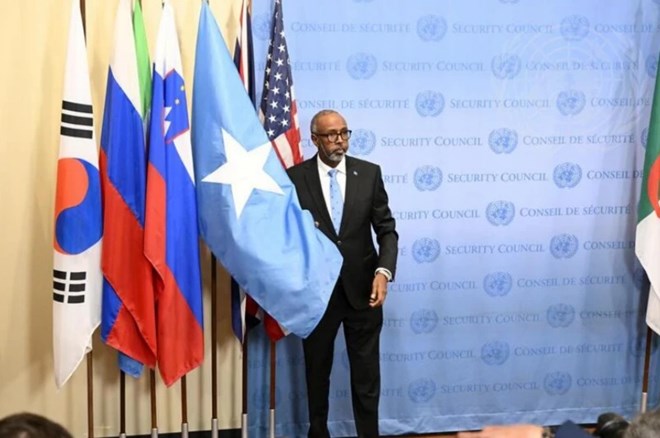
Saturday January 4, 2025

Somalia's Permanent Representative to the United Nations, Abukar Dahir Osman (Baalle), raises the Somali flag during the ceremony marking Somalia's induction as a non-permanent member of the UN Security Council for the 2025-2026 term at the United Nations headquarters in New York./ UN News
Mogadishu (HOL) — Somalia has officially joined the United Nations Security Council as a non-permanent member for the 2025-2026 term, a move lauded as a step in elevating the country's global standing. At a flag-raising ceremony at the UN headquarters in New York, Somalia was celebrated alongside four other newly elected members: Denmark, Greece, Pakistan, and Panama.
Somalia's Permanent Representative to the United Nations, Abukar Dahir Osman (Baalle), described the appointment as a transformative moment for the nation. He emphasized Somalia's ambition to actively participate in resolving international challenges while advancing African interests, particularly in the Horn of Africa.
"This seat amplifies Somalia's voice on the global stage, giving us the opportunity to contribute meaningfully to discussions on peace, security, and development," Baalle said during his remarks.
The seat is expected to strengthen Somalia's role in global decision-making and position it as a key player in addressing regional conflicts and security concerns. President Hassan Sheikh Mohamud echoed these sentiments, describing the development as "a new chapter" for Somalia in peacekeeping and international leadership.
The celebration marks Somalia's second tenure on the Security Council, with its first term in 1971-1972 disrupted by years of civil war and state collapse. The election comes as Somalia continues its fight against al-Shabaab militants and rebuilds its governance with support from international partners like the United Nations and the African Union.
President Mohamud emphasized Somalia's dual representation of the African Union and the Arab League, pledging a focus on justice and inclusivity. "This moment reflects Somalia's resilience and commitment to global peace and security," he said in a statement.
Somalia's presence on the council also raises questions about its role in representing East Africa. Foreign Minister Ahmed Moalim Fiqi assured that Somalia would uphold fairness in its representation, adding, "We will act justly in all matters, ensuring that no bias or injustice arises from our position."
The flag-raising ceremony, a tradition introduced in 2018, was a reminder of Somalia's return to the global stage. Permanent representatives of the new members delivered brief speeches before raising their national flags outside the Security Council Chamber.
Kazakhstan's UN Ambassador, Kairat Umarov, who presided over the event, congratulated the new members and called for collaboration. Amar Bendjama, Algeria's UN Ambassador and January's Security Council President, praised the outgoing members for their service and welcomed the new entrants.
"This is both an honor and a responsibility," Bendjama noted, urging all members to work collectively in tackling global challenges.
The UN Security Council comprises 15 members—five permanent members with veto power (China, France, Russia, the United Kingdom, and the United States) and ten non-permanent members elected for two-year terms. Non-permanent members, while lacking veto power, play a vital role in shaping the council's discussions and decisions.
The council operates largely on consensus, with formal meetings and resolutions often preceded by informal negotiations. These behind-the-scenes discussions allow members to reach agreements before taking official votes.
Somalia's election comes amid ongoing efforts by the African Union to secure greater representation on the council, including two permanent seats and additional non-permanent seats for the continent. Somalia's success underscores Africa's determination to have a stronger voice in global governance.